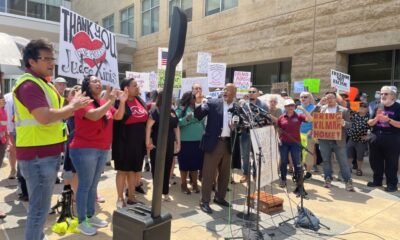border
Months After Arresting Tren de Aragua Suspects, Authorities Fail to Present Gang Evidence

**HAYS COUNTY** — In late March, a gathering of Venezuelan relatives and friends celebrating birthdays took a chaotic turn when law enforcement executed a raid at their rented six-bedroom home in southern Austin. The authorities arrived around 5 a.m., using flashbangs to gain entry while shouting commands at the startled partygoers.
One attendee, a 30-year-old father, recalled the confusion and fear as his family hastily tried to reassure officers about the presence of young children in the house. Amid the chaos, he and his 24-year-old wife were apprehended along with their kids, aged 5 and 3.
Authorities claimed to have dismantled a gathering of the Tren de Aragua gang, a violent organization that originated in a Venezuelan prison and has since spread throughout Latin America. While 47 individuals, including nine minors, were taken into custody, it remains uncertain how many were directly involved with the gang.
In an exclusive interview, the father vehemently denied gang affiliations, asserting that an agent wrongly linked him to criminal activities based solely on his tattoos. Fearing repercussions from both U.S. and Venezuelan authorities, he requested anonymity due to his pending asylum case.
The operation in Hays County reflects a broader trend of aggressive enforcement tactics targeting Venezuelan nationals since former President Trump invoked an obscure law to expedite deportations of those alleged to be gang members. Critics argue the approach undermines due process and raises serious ethical concerns.
“It sets a dangerous precedent,” said Muzaffar Chishti of the Migration Policy Institute. He warned that the current approach could threaten the rights of all immigrants, not just those accused of gang participation.
Despite assurances of a thorough investigation, the agencies involved have not released compelling evidence linking those detained in the raid to the Tren de Aragua gang. A recently reviewed search warrant revealed scant information about what prompted the operation, and crucial documents remain sealed, limiting transparency.
Texas authorities have since requested permission to withhold sensitive records, further complicating public access to information regarding the raid. Only two individuals were formally charged on drug-related offenses, while many others faced immediate deportation proceedings.
Just days after being released from detention, the Venezuelan family returned home to find themselves facing eviction and financial instability. Their five-year-old son missed substantial school time due to the raid. While hopeful for their future in the U.S., uncertainty looms large over the family.
“We were treated like criminals,” he lamented, struggling to understand the harsh actions taken against them during what was supposed to be a joyful celebration.


















